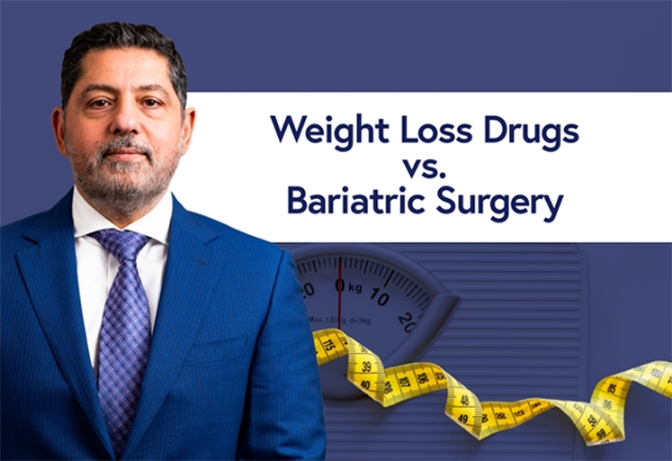Weight Loss Drugs vs. Bariatric Surgery – Which is Right For You?
If you’re trying to lose weight and finding it difficult, you may have considered taking medications or undergoing bariatric surgery. Both of these... read more
Call Us Today (732) 640-5316
E-Waiting RoomWhile it is considered fairly safe and extremely effective, bariatric surgery is complicated and the way it affects your body is still being researched. Many people don’t think much beyond “less food = less weight” when it comes to bariatric surgery and weight loss. Your stomach is smaller after bariatric surgery and you can’t eat as much, so that’s why you lose all that weight, right? Yes, but that’s not the whole story.
Decreasing your food intake has a vast impact on hormone production – and hormones have a huge impact on the way you feel. Weight loss is more complicated than a lot of people think.
There are many different hormones at play when it comes to food consumption and your body’s method of regulating it. But the hormone that helps you feel full and satisfied (often one of the biggest factors in the success or failure of dieting) is the satiety hormone, or leptin. So, what is leptin? How does it affect the body? And how does getting bariatric surgery affect your production of leptin?
Leptin is a hormone produced in the body’s fat cells, and is responsible for that feeling of satiety after eating. The “opposite” of leptin – the hunger hormone called ghrelin – is produced when leptin levels are low, and ghrelin levels go down when leptin is produced. The two work in perfect harmony to make sure your body is getting the energy it needs, when it needs it – or at least that’s the way it’s supposed to be. Here’s how leptin works.
Leptin tells your brain, particularly the hypothalamus, when the body has enough fat stored and does not need any more food. Leptin has a lot of functions in your body, but its biggest role is to regulate long-term energy balance – how many calories we eat and burn, and the amount of fat we store in our bodies.
Leptin is supposed to keep you somewhere in the middle of starving and overeating. As we evolved, leptin became very good at keeping us from starving – but has lost its touch when it comes to stopping us from overeating. This is a particular problem when a person is already prone to obesity, and leads us down the slippery slope that is today’s increased obesity rate.
People living with obesity are often stigmatized as people who lack willpower or eat even when they aren’t hungry. But what the majority of people don’t know about obesity is that it’s a vicious cycle – one that obese people don’t have a lot of control over – and leptin resistance blame.
Long story short: obese people have built up a resistance to leptin – meaning that even though the body is producing leptin, the brain doesn’t “see” it. This leads to the brain erroneously thinking that the body is starving, even though it has plenty of fat stored up and ready to burn. When this happens, the brain sends the signal for ghrelin production, meaning obese people really do feel hungry more often and feel less satisfied when they eat. The brain also thinks that, because the body is “starving”, energy must be conserved. This leads to feelings of laziness and makes calories burn slower – compounding the issue.
Aside from leptin resistance, there are people who just produce a much lower amount of leptin than normal, which leads to weight gain for the same reasons.
After bariatric surgery, leptin production has actually been shown to increase. Obviously, if you have leptin resistance, this won’t make a difference as your body is already producing enough leptin, it’s just not recognizing it. However, if you are one of those people who produces a low amount of leptin, this is a game changer in the way that you feel on a daily basis (and your ability to lose weight).
In regards to leptin resistance, bariatric surgery may have a big role in reducing its effects – by decreasing the hunger hormone ghrelin. Unlike leptin, ghrelin is actually produced in the stomach. During bariatric surgery, specifically laparoscopic sleeve gastrectomy, the size of the stomach is significantly reduced. Because ghrelin is mainly produced in the stomach, ghrelin levels are significantly reduced as well. So, even if your brain is telling your body to produce more ghrelin when it doesn’t need it – it actually can’t. Eventually, your body will be able to regulate its leptin production and bring itself down from leptin resistance. That’s the leptin resistance loop-hole!
After bariatric surgery, you can’t eat as much and you feel full for longer. In fact, many people who were hungry all the time before surgery notice that they have to set timers to remind themselves to eat after bariatric surgery. It’s that powerful, and this is the reason bariatric surgery has such long-term success.
Want to know more about how bariatric surgery can help you control your appetite and see real, life-changing results? Get started today! Contact Advanced Surgical and Bariatrics at our Somerset, NJ location.

Dr. Ragui Sadek is a premier surgeon who established a state-of-the-art and one of the safest bariatric surgery programs in the state. Dr. Sadek has fellowship training in both laparoscopic/bariatric surgery and surgical trauma/critical care, allowing him to safely perform complex surgeries on patients who have been turned down by other practices. As a Clinical Assistant Professor of surgery at RWJ Medical School & the Director of bariatric surgery program at RWJ University Hospital, Dr. Sadek offers a cutting-edge range of laparoscopic, robotic, & bariatric surgical procedures with a complication rate substantially below the national average.
Dr. Sadek is a Clinical Assistant Professor of Surgery at Rutgers-Robert Wood Johnson Medical School and a Fellow of the American College of Surgeons. Having performed more than three thousand advanced surgical procedures, Dr. Sadek has established a strong patient satisfaction rate and a solid reputation among the surgical community and is renowned as a top physician in his field by International Association of Healthcare Professionals. As a board-certified surgeon, he holds affiliations with the American Society of Metabolic and Bariatric Surgery and the Society of American Gastro Endoscopic Surgeons. More about Dr. Sadek
Stay current with Advanced Surgical & Bariatrics of New Jersey

If you’re trying to lose weight and finding it difficult, you may have considered taking medications or undergoing bariatric surgery. Both of these... read more

Are you frustrated with your inability to lose weight? Tired of being trapped in an endless cycle of yo-yo dieting, over-exercising, cleanses, and... read more